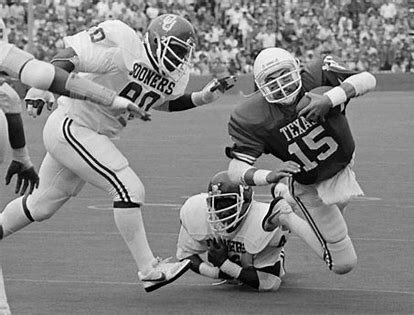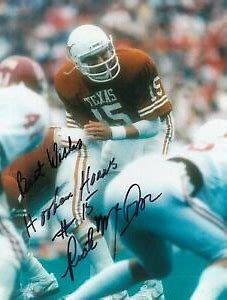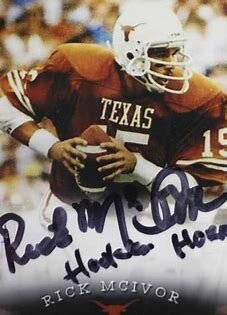Below is part of an article by Dave McKenna about Longhorn Rick McIvor written for Defector . The full article is at
https://defector.com/an-arm-and-a-legend-rick-mcivor-and-the-100-yard-throw/
An Arm And A Legend: Rick McIvor And The 100-Yard Throw By Dave McKenna for Defector.com
The 6-foot-4, 210-pound McIvor would be named to the Texas Sports Writers Association (TSWA) all-state team as a quarterback his senior season, his first as a starter at the position. He’d likewise make the 1979 Parade Magazine All-American team at quarterback, alongside future NFL all-timers Dan Marino and John Elway. McIvor was also all-state at defensive back and placekicker, reportedly making him the first player in Texas ever given statewide honors at three positions. McIvor was also known as the best punter in West Texas, and had a record-setting 63-yard punt in the annual statewide all-star game in Dallas in 1979. He did real well athletically away from the gridiron, too: McIvor was Fort Stockton’s best basketball and baseball player, on the state champion mile-relay team, and a decorated rodeo cowboy with lots of belt buckles from roping and riding. None of this is the most astounding thing about him, at least based on what I heard.
The greatest thing I (Dave McKenna) ever heard about McIvor, and maybe the greatest thing I ever heard about anyone, was about a pregame exercise that Rafe said he witnessed. To show off his quarterback’s great gifts, and maybe to psych out the opposition, their coach had McIvor stand at a goal line and throw a football as far as he could—which was all the way to the other goal line. Yup, the length of the field. A 100-yard toss, or so the story went.
McIvor had a spotty, injury-plagued career quarterbacking the University of Texas, and a short, insignificant stay in the NFL before returning to Fort Davis to work on ranches. He’d later take up a law enforcement career. People who cared about football almost certainly forgot about him as he was crowded out by newer and even more impressive models.
“I wasn’t out there every day,” he says. “Couple of things people forget: McIvor could kick or punt a football about as far as he could throw it and he was a terrific defensive safety. There didn’t seem to be a thing he couldn’t do on a football field. It’s not too much of a stretch to make up the rest.”
“Here’s a story I told everybody all the time,” says Sultemeier, who played football at West Point after high school. “I watched Rick McIvor throw a pass to [a Fort Stockton receiver] in a game and I know the ball traveled 80 yards in the air. I know it happened. I saw it. So, could you line Rick up before a game, and have him throw it the length of the field? Well, yeah, I could see him do it. I really could. It was unbelievable the cannon he had. Just unbelievable. Never in my life have I seen anybody, pro or college, who could throw a football like Rick McIvor. Nobody. Bar none.”
Word of McIvor’s prodigious talents spread way beyond Fort Stockton during his last year of high school. The campus of the University of Texas at Austin was about 340 miles away; Sultemeier says scouts and coaches from UT showed up at most practices that year. Newspaper archives are full of contemporaneous crowing about his abilities.
The Quad City Times of Davenport, Iowa, ran a column on Jan. 13, 1979 all about McIvor’s recruiting visit to the University of Iowa. The piece detailed how Coach Hayden Fry of the University of Iowa had pinned his future on landing McIvor. “I’ve got to get me a quarterback,” Fry told the newspaper, “and I want the number one kid in Texas.” In the end, as is usually the case, UT got the top guy in Texas. Fry lasted another 20 years at Iowa without him. Unicorns are mythical creatures, mostly.
McIvor’s deeds upon his arrival in Austin make the legend that followed and surrounded him seem possible.
The Santa Fe New Mexican on Sept. 2, 1979 had UT Coach Fred Akers crowing about McIvor’s “rifle,” and noted unspecified reports that McIvor “threw a ball 90 yards.” The Fort Worth Star Telegram on Nov. 5, 1979, columnist Pat Truly detailed with awe a “loosening up” session held a day before UT’s game with Missouri. “McIvor, they say, stood on the 5 yard line, positioned [teammate] Brad Beck at the 20 on the other end of the field and proceeded to play catch with Beck.” Texas receiver Les Koenning told Truly that McIvor’s arm’s reputation preceded his arrival in Austin, and that at first he laughed off the hype about the freshman from Fort Stockton who’d “fool around” and throw a football “70-80 yards.” Then he caught passes from the new kid.
“I didn’t believe it until I saw him do it,“ Koenning said.
Sports Illustrated promoted the legend throughout McIvor’s stay in Austin. A 1981 story described McIvor as being “equipped with a goal-to-goal arm.” Another SI story that same season quoted UT publicist Jones Ramsey gushing to head coach Fred Akers that he’d seen McIvor “wing it 88 yards on the fly.”
“We don’t have an 88-yard play,” said Akers.
“Let’s put one in!” Ramsey answered.
Kirk Bohls, a longtime writer for the Austin American Statesman, has occasionally typed that McIvor possessed the strongest arm of any quarterback he ever covered. When I asked Bohls about throwing the length of the field, he brought up another of McIvor’s “fooling around” sessions he personally saw.
“I remember the day in practice when he was fooling around and threw a ball 92 yards from one goal line almost to the other,” Bohls said. “My jaw just dropped.”
Throw in a good gust of West Texas wind and/or put on some fan goggles, and those 92 yards could easily stretch from goal line to goal line. Bohls, at least, wants to believe.
But, if the Texas offense ever installed that “88-yard play” the program’s publicist requested, Akers never called it. And if there are morals to McIvor’s tale, one of them would be that the arm alone doesn’t make the quarterback. McIvor’s seemingly limitless potential didn’t translate to greatness on the field in college. Injuries, inconsistency, and some reported academic issues kept him from keeping the UT starter’s job.
There were some moments, though. McIvor quarterbacked Texas to a 34-14 win over Oklahoma in the 1981 Red River Rivalry game, which put UT atop the national polls early in the season. And he came off the bench in the second quarter, with the Longhorns down 13-0 against mortal intrastate enemy Texas A&M on Thanksgiving weekend in 1983, to lead UT to a 45-13 rout that’s still talked about. He threw four touchdown passes.
But his run at the school ended on a notably non-mythic note. In the 1984 Cotton Bowl against Georgia, Akers played a hunch and grabbed McIvor off the bench, giving the senior QB his first start in three years. Texas went into the game ranked second in the polls. He played poorly in a 10-9 defeat, the Longhorns’ only loss of the season. Top-ranked Nebraska went on to lose in the Orange Bowl, which means that Longhorns fans of a certain age still blame McIvor for UT’s failure to win that national championship.
The Austin American-Statesman’s report on his sheriff campaign, headlined “The Long Arm of the Law,” said the candidate “once aired a football 98 yards in the Seattle Kingdome.”
xxxxxxxxxxxxxxxxxxxxxxxxxxxxxxxxxxxxxxxxxxxxxxxxxxxxxxxxxxxxxxxxxxx
Below comments denoted in blue font are not part of Dave McKenna’s great article about Rick McIvor, but add an extra dimension to Rick’s years as a Longhorn.
McIvor arrived in Austin in 1979, as part of a highly touted class of quarterback recruits and was often considered as a player that could be moved back to defensive. He was also the team's back-up place-kicker. But blessed with exceptional arm strength, the 6 ft 4 in McIvor showed promise in the 1979 Baylor game when, as a true freshman, he played in place of Donnie Little and threw for 270 yards and so he remained a quarterback.
McIvor's first chance to shine came in the 1979 Texas Tech game when Coach Fred Akers used three quarterbacks to win 14-6. McIvor threw the game's only touchdown pass and most of the passing yards for Texas. A few weeks later, after backup quarterback Jon Aune moved to defensive back, McIvor replaced Little in the TCU game, when Little left with sore ankles, leading the team on an 80-yard touchdown drive and running the offense for most of the second half. His first career start came the next week against Baylor and McIvor played well, throwing for 270 yards, then a Texas record, and 1 touchdown in leading the team to a 13-0 win. He started the last two games of the season losing to A&M 13-7 and to Washington in the Sun Bowl 14-7.
In 1980, he again entered the season as the back-up to Little. He saw mop-up action in the 35-0 blowout over Oregon State and came in for relief of Little in losses against SMU and Texas Tech. He nearly led the team back from a 24-0 deficit in the Tech game, until he was poked in the eye and had to leave the game. He earned the starting job for the Houston game, which they won 15-13, but sat out the next two weeks due to an injury. He returned to share quarterback duties with Little for the losses to Baylor and Texas A&M to end the season. When Little was injured during the last game of the season, McIvor was again named the starting quarterback for the bowl game, which they again lost, this time to North Carolina in the Bluebonnet Bowl. That year, he was the Southwest Conferences highest rated quarterback with a 121.8 rating.
During the off-season, Little volunteered to move to wide receiver because he felt it would be his best shot at an NFL career, and McIvor became the starting quarterback for the 1981 season. After winning the first four games, including back-to-back wins over ranked Miami and Oklahoma, Texas was ranked #1. But McIvor's job was in danger after a disastrous 42–11 loss to unranked Arkansas in week 5. Texas won the next two games with McIvor under center, but he lost his position to walk-on Robert Brewer midway through the Houston game when he suffered an injury to his right shoulder and nerve damage to his neck. Texas was trailing when McIvor was pulled, but eventually closed with a 14-14 tie due to Brewer's efforts. It took him several games to recover from the injury and he threw only one more pass the rest of the season and it would more than 2 years before he would get a chance to start again.
Just before the start of the 1982 season, McIvor suffered a knee injury in practice that would require surgery to repair damaged ligaments, so he redshirted the 1982 season. He missed the following spring practice because his grade point average had dropped below the requirement for upperclassmen and he had to drop out of school for a semester. He went home and worked on his father's ranch.
In 1983, it appeared that McIvor would be the starting quarterback. But Todd Dodge was named the starter during summer practices after McIvor spent a couple of days in the hospital with an infected wrist and elbow. Later in the fall, a shoulder injury to Dodge in the final preseason scrimmage led to McIvor splitting time with his best friend Rob Moerschell in the first game of the season against Auburn. Despite an 80-yard touchdown pass McIvor threw in that game, one of the longest in Texas history, Moerschell emerged as the starter. Thanks to a head injury in the next game against North Texas, McIvor saw limited play for most of the season as the starting quarterback role went from Moerschell to Dodge and back to Moerschell. But, during the last game of the regular season, against in-state rival Texas A&M, McIvor replaced Moerschell when the #2 Longhorns fell behind 14–0 and played spectacularly. He led the undefeated Longhorns to score 45 unanswered points, throwing for 170 yards and a record 4 touchdown passes without any turnovers. He played so well that he was named the starter in the following game, the 1984 Cotton Bowl.
In his last game as a Longhorn, McIvor led #2 Texas against #7 Georgia in a game with National Championship implications. Texas held onto a small lead until late in the 4th quarter but a muffed punt return gave Georgia the opportunity it needed to score the game-winning touchdown. McIvor threw for 168 yards and 2 interceptions with no touchdowns. Later that day, #1 Nebraska was upset by #5 Miami, Fl, an outcome that would have secured Texas its 4th National Championship had they beaten Georgia.
McIvor finished his career at Texas with a record of 8–5–1 as a starter, but was 0-3 in bowl games.



